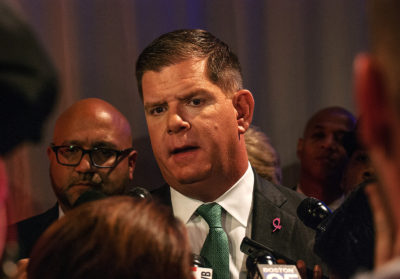
The Boston branch of the NAACP released a report card evaluating Mayor Martin Walsh’s administration Sunday, stating he failed to bring about the changes he promised for Boston’s communities of color.
In the 175-page document, the NAACP report scored the administration on its efforts as well as it results in furthering economic and racial equality in Boston. The poorest grades were seen in diversity staffing within the Boston Fire Department, which the report scored F under effort, as well as in economic development which received an overall grade of a D.
Segun Idowu, the third vice president of the Boston branch of the NAACP and a project manager for the report, wrote in an email to The Daily Free Press the project had been in the works since the 2013 mayoral election to hold whoever won the mayoral election accountable for their campaign promises.
“It is our responsibility to hold elected and appointed leaders responsible, and to ensure that they are adequately addressing issues that are important to us,” Idowu wrote. “Any form of constructive criticism is good and healthy for democracy. You will notice that beyond just critiques, we offer recommendations in each chapter of the report that we hope to collaborate with the administration in fulfilling.”
Idowu said the data used in the report was either given to the NAACP via Walsh’s administration or taken from publicly available city reports, so the results of the report should not have surprised the administration.
Through this data, Idowu said, the report shows there needs to be work done to ensure everyone who lives in Boston is prospering at the same rate.
“It should be noted that the administration receives higher scores for efforts than for results,” Idowu wrote. “This tells us that while the administration is putting forth an effort, in some key areas they either have not applied enough pressure, or they have started initiatives or programs too soon for us to determine the effects of each.”
Walsh said in a statement his office would further review this new report, but there were several aspects and claims made in the report with which he did not concur. He said the City has been striving to achieve equal opportunity for all communities in Boston and the City will continue to work for this equality.
“We need to take the time to closely review this report, however we respectfully disagree with the grades given,” Walsh said in the statement. “While there is always room for improvement, we are very proud of what we have been able to accomplish over the past four years, from creating opportunities for minority and women owned businesses to building affordable housing for all income levels, to adding over 700 pre-kindergarten seats to expand early learning opportunities.”
Paul Watanabe, a political science professor and the director of the Institute for Asian American Studies at the University of Massachusetts Boston, said it is important to see the bigger picture offered by reports such as this one.
“It is valuable for the NAACP, and other organizations as well, to continually take stock of the status of people of color within the city of Boston,” Watanabe said. “I think it was appropriate of them to engage in this exercise in trying to inform the public what kind of progress we’ve made in areas like public safety, housing, and racial relations within the city.”
Watanabe said although issues brought up in the report are present in the city, many still believe properly addressing them does not require a change in leadership.
Several Boston residents said they were split in their response to the administration and the accuracy of the scores seen on the report.
Alba Diaz, 43, of Allston, said she could not complain about Boston and how it has treated her and her family concerning race relations, despite the results of the report.
“Boston is a good city [when it comes to race relations], and I’ve been here for a long time and have had no problem,” Diaz said. “My son was born here and goes to school here — it’s all good.”
Ricardo Vasquez, 27, of Roxbury, said the racial tension in Boston is something he has learned to adapt to. As a solution, Vasquez said equality focused initiatives need to start by addressing Boston’s youth in order to relieve racial tension within the city.
“There should be more initiatives for the youth, that’s where everything starts,” Vasquez said. “Living in Boston all my life — things were maybe a little bit better when Mayor Menino was around. Now, it’s a little bit harder for my peers and younger peers. The resources aren’t where they need to be.”
Dave Mansaray, 50, of Mattapan, said his son attends Boston Latin Academy and there are concerns with diversity there, which is a reflection of the city’s problems.
“There’s a lot of complaints about diversity [at Boston Latin Academy] and I don’t like the way teaching is going on,” Mansaray said. “The mayor needs to hire more black people and put them in more positions in schools so no one will feel like they’re being left behind.”

